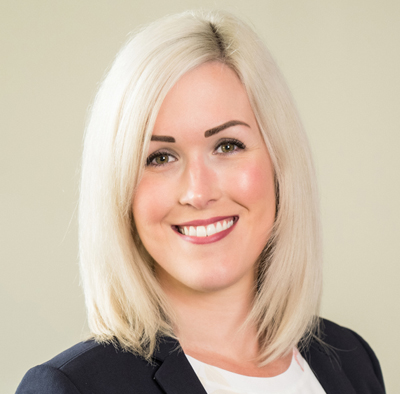Shauna Campbell, DO

Please tell us about your role at the Cleveland Clinic Taussig Cancer Center. Are you involved in patient care, teaching and/or research?
I am currently in my 4th year of residency and the chief resident at Cleveland Clinic. Like most residents, patient care is the biggest part of my day-to-day activities, but I have also enjoyed my research time this year. During this time, I have enjoyed investigating the use of SBRT for primary and metastatic liver tumors, evaluating PSA kinetics on outcomes of salvage radiation, and exploring new leadership roles. I have enjoyed my research time so far, but it also helped me understand how important the day-to-day interactions with patients are for me.
Why did you decide to become a radiation oncologist?
My journey into radiation oncology is a bit different than most. While attending college I never had the intention of going to medical school, let alone becoming a radiation oncologist. After completing two years of general BSc requirements, I joined the Radiation Therapy Technology program where I completed the education and training to become a radiation therapist. During my last year of college, I found myself wanting to learn more about the “why” of radiation oncology rather than just the “how,” and decided to pursue medical school. Upon graduation, I joined a clinical trials department and learned more about research in radiation oncology and also worked to obtain the necessary coursework for medical school. Upon entering medical school, radiation oncology was at the top of my list, and although I enjoyed most of my clinical rotations, nothing else compared.
How do you envision the future of the field of radiation oncology? In what ways would you like to see it grow/evolve?
I believe the future of radiation oncology is promising and look forward to seeing the transformation throughout my career. When I think of the evolution of planning and delivery from 2D to VMAT, it is exciting to anticipate how future technologies such as FLASH RT and carbon ion treatment can impact the use of radiation. We have also entered into a new time where radiation plays an important role for patients with oligometastatic disease and those receiving immunotherapy. With these factors, radiation will be an important component of multidisciplinary treatment for patients with all stages of cancer.
Tell us about your leadership role with ARRO.
I have spent the last year as a junior executive committee member of ARRO, and moving into my senior year, I am fortunate to have the opportunity to lead the committee as chair. This is an exciting opportunity because I believe ARRO is imperative to representing the interests of radiation oncology residents to leadership societies such as ASTRO and the ABR. ARRO also provides important educational resources for residents at all stages of training.
In addition, I have had the opportunity to work with organizations such as the ROI to learn about how it contributes to the future of radiation oncology.














